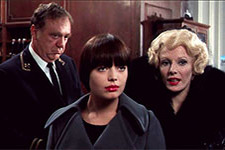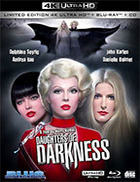Daughters of Darkness (Les lèvres rouges) (4K UHD)
|  A purposefully difficult-to-classify hybrid of European art-film austerity and borderline campy erotic-horror excess, Harry Kümel’s Daughters of Darkness (Les lèvres rouges) is one of the most effective of the revisionist vampire films that emerged all over the continent in the 1960s and early ’70s. Following Roger Vadim’s Blood and Roses (1960) and Hammer Studios’ increasingly exploitative trilogy (1970’s The Vampire Lovers and 1971’s Lust for a Vampire and Twins of Evil), Daughters of Darkness successfully reinvigorated the myth of the lesbian vampire, which dates back at least to the horror stories about Elizabeth Bathory, the 16th-century Hungarian countess who supposedly bathed in the blood of slaughtered virgins to maintain her youth. Kümel and coscreenwriters Pierre Drouot and Jean Ferry center their film on the Bathory mythos, suggesting that she is still alive and well and slinking about Europe, searching for new victims. The key to Daughters of Darkness is the casting of French actress Delphine Seyrig as Countess Bathory. At the time, Seyrig was the toast of European art cinema, due primarily to her role in Alain Resnais’s much-debated New Wave masterpiece Last Year at Marienbad (1961), although she had also appeared in films directed by such art-film luminaries as François Truffaut (1968’s Stolen Kisses) and Luis Buñuel (1969’s The Milky Way). Seyrig, with her porcelain beauty and imposing stature, brings a cool, aristocratic air to the countess. In her silvery lamé gowns and perfectly coiffed hair and makeup, she seems to be just outside of the action, looking down on it with her sharp eyes from some higher vantage point while she plays the people around her like pieces on a chess board. With no apparent effort, she appears to have existed for hundreds of years and not aged a day. The countess sets her sights on a young couple staying for a few nights at a mostly deserted hotel in Ostend during the wintry off-season. The couple, Stefan (John Karlen) and Valerie (Danielle Ouimet), are newlyweds on their way to England, but have stopped off in Ostend so that he can inform his mother of their nuptials, something he is oddly reluctant to do. The countess, along with her seductive traveling companion Ilona (Andrea Rau, a dancer-turned-Playboy model who supplies most of the film’s nudity), set about drawing Stefan and Valerie into their web, although not everything is as clear-cut as it first appears. Kümel resists any simplistic good/evil divide by complicating each of the characters in compelling ways. The countess is too charming and charismatic to be written off as a complete monster, while Ilona is quickly revealed to be a rather pathetic pawn in the countess’s game. As to Stefan and Valerie, they are hardly the well-scrubbed young innocents that they first appear to be, especially Stefan, who is revealed to be a sadist hiding his own “aberrant” sexual past. Valerie is the closest thing the film has to a token innocent, but the manner in which she allows herself to be seduced by the countess and eventually takes her place suggests a dark interior that has been waiting to be tapped. Cinematographer Eduard van der Enden, who shot Jacques Tati’s Trafic (1971) the same year, imbues the film’s imagery with a haunting sense of the modern gothic. There is one particularly brilliant shot in which the countess first steps into frame with her face draped in shadows, leaving only her mouth, painted blood red with lipstick, visible. Van der Enden does equally impressive work inside the enormous coastal hotel where the characters are staying (actually a combination of two Belgian hotels), which is a hollow, imposing space that takes on the aura of a decadent, deserted castle; both are places of great wealth and privilege that have since declined, a crucial characteristic of gothic storytelling. Kümel is particularly adept at linking characters and the environment, as the hotel, with its grand, empty lobby and imposing staircase leading into darkness, becomes a kind of tomb. Death is everywhere, but the characters can’t see it because they are too caught up in themselves. The film’s slow-burn tragedy is underlined by a powerfully subversive undercurrent about female empowerment, which frequently boils just under the surface of lesbian vampire narratives. Unlike most lesbian vampire films, Daughters of Darkness is understated rather than exploitative, feeding off sexual tension rather than flaunting naked sexuality. Male anxiety about being unneeded (or unheeded) by the women around them is particularly pronounced here, as Stefan’s sadistic tendencies and need for control are clearly little more than desperate stabs at the traditional masculinity he studiously lacks. His victimization is all but inevitable, as it provides the catalyst for Valerie’s escape, although it is debatable as to whether her literal merging with the countess by the end is a triumph or another kind of imprisonment.
Copyright © 2020 James Kendrick Thoughts? E-mail James Kendrick All images copyright © Blue Underground | |||||||||||||||||||||||||||||
Overall Rating: 


 (3.5)
(3.5)


